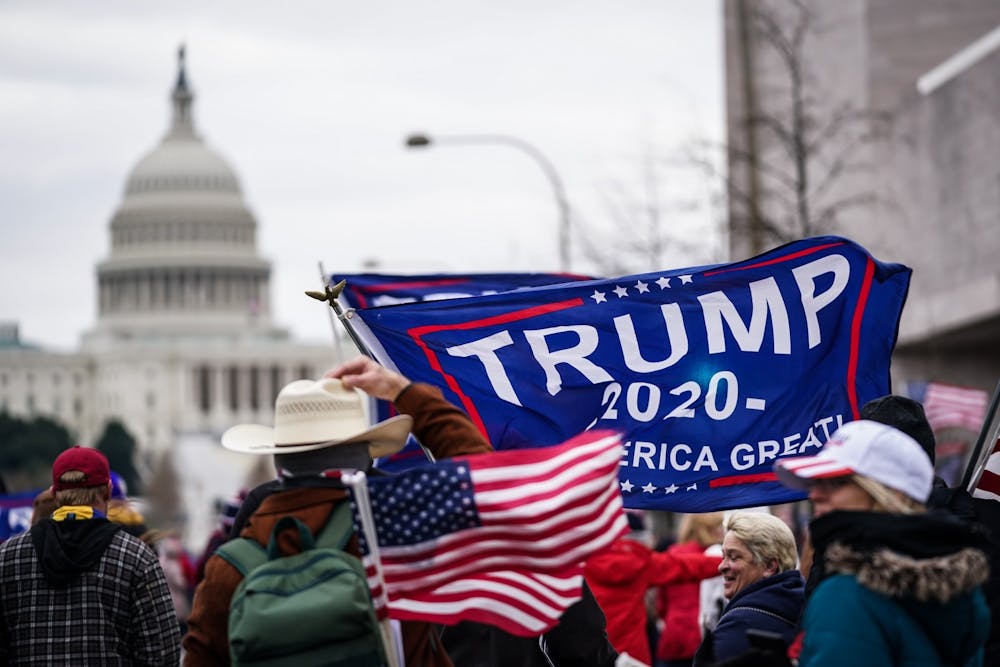
With the defeat and two-time impeachment of former President and 1968 Wharton graduate Donald Trump, conservatives — including those on campus — are refocusing their mission to carry on Trump's legacy and ensure electoral victories for their party in the future.
While Trump received over 74 million votes cast in his favor during November's presidential election, the Republican Party lost control of both the presidency and the Senate for the next two years. This leaves them in the position to find their footing again and rethink their strategies.
From his campaign to his time in office, Trump played a big role in moving the Republican Party further to the right on salient issues such as trade, immigration, and national security according to Political Science professor Matthew Levendusky.
Levendusky believes that following President Joe Biden's inauguration, the Republican Party now has to evaluate their best course of action and how closely they want to be associated with the former president's policy positions and actions while in office.
“It is tough to know where the Republican Party is now,” Levendusky said. “Did Trump take over the party, or did he just rent it for four years?”
Penn College Republicans Communications Director and College sophomore Harrison Selznick said that he has seen the Republican Party’s platform shift towards populism since Trump was inaugurated into office. He said that by putting America first, the Trump presidency allowed “the American people's success to be the most important objective of the government.”
Levendusky said that the high voter turnout for both Democrats and Republicans is a testament to how people vote when they perceive a lot to be on the line. Biden received about 81.3 million votes — a record in United States history — and more than 7 million votes more than Trump. About 67% of the voting-eligible population cast their ballot in the 2020 presidential election — the highest percentage in over 120 years.
Wharton sophomore Justin Chan, who identifies as a Republican, said there were three types of Republican voters in last year’s election: those who happily voted for Trump because of his personality, those who voted for Trump just because they always vote Republican, and the Republicans, like himself, who voted for Biden. He sees the divide between more traditional Republicans and those who favor Trump-era policies as one of the biggest factors that the GOP needs to overcome in the near future.
While Trump’s rhetorical style allowed him to stand apart from other Republicans, Levendusky said his personality will not be easy to replicate in the future. He said it is much more likely that people who hold similar policy positions will copy his set of approaches rather than his personal style.
Chan said that Trump was very successful in using his polarizing rhetoric to shift the party’s platform away from what it originally was. He also mentioned that Trump’s divisive tactics have only contributed to an increase in animosity between the parties.
Political polarization has increased across the country in recent years, according to a poll by the Pew Research Center. Before the election, about 90% of both Republicans and Democrats would have been "very concerned about the country's direction" had the candidate they not favored won.
“He creates an ‘us-versus-them’ mentality,” Chan said. “Republicans really have to go back to their fundamental principles of being for the individuals.”
Selznick agreed, stating that he believes that the general public opinion on conservative politics has become more polarized over the past four years due to “the inflammatory Trump presidency and politicized media that would not separate opinion from truth.”
Down the road, Selznick added that he believes maintaining Trump’s base should be extremely important for the GOP in order to ensure electoral success for the Republican Party.
Levendusky said that the GOP must also address Trump’s claims of election fraud. While 61 of Trump's 62 lawsuits across the country have failed according to USA TODAY, 39% of people surveyed said that they do not trust the American electoral process according to a poll conducted earlier this year by Vox and Data for Progress.
“[The claims] were never found to have merit or even really able to produce any credible evidence at all,” Levendusky said. “How the Republican Party grapples with the legacy of that moving forward is one of the other things that has to be resolved.”
In regards to the future of the party, Selznick said that he hopes Republicans will work to bring back suburban voters and maintain their support with working-class Americans. He believes the GOP must retain the confidence of existing Trump supporters by “following Trump’s ideology of an America-first future.”
Chan said the best course of action for the Republican Party is to recognize the demographic change across the nation: Trump had more support from Cuban and Venezuelan voters, among other minorities, than recent Republican candidates. He also believes it is essential for the party to look back and return to its principles of small government.
Overall, it may be too early to tell what course of action the GOP will take, according to Levendusky. While the current political environment is always changing, he still emphasized that there are big questions that the Republican Party leadership needs to ask themselves.
“The broader question for Republicans is what happens in the long term?” Levendusky said. “Do they double down on ‘Trumpism,’ or do you move back into a new direction?”
The Daily Pennsylvanian is an independent, student-run newspaper. Please consider making a donation to support the coverage that shapes the University. Your generosity ensures a future of strong journalism at Penn.
Donate







